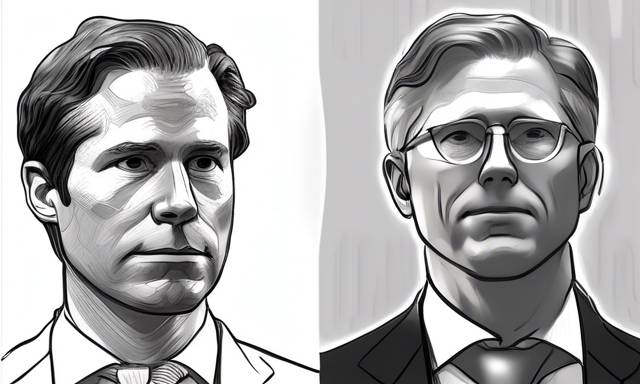What’s Happening with Ripple and the SEC and Why Should You Care?
The crypto world is buzzing, and if you’re even remotely interested in the science of digital currencies and their regulation, Ripple and the SEC’s latest legal wrangling is something you definitely want to pay attention to. So grab your favorite beverage, and let’s dig in.
Key Takeaways:
- Ripple Labs is pursuing a legal appeal against the SEC’s claims about its XRP token.
- Four pivotal questions have been raised regarding investment contracts and regulatory clarity.
- The outcome will impact Ripple’s status and the broader crypto market’s legal landscape.
Just recently, Ripple Labs decided it was time to amp up its legal battle with the U.S. SEC. They filed what’s known as a Civil Appeal Pre-Argument Statement. Now, if that sounds formal and bureaucratic—well, it is. But let me assure you, the implications of this filing are very much worthy of your attention—especially if you’ve got (or are thinking about getting) any skin in the crypto game.
Ripple’s Challenge to SEC’s Authority
Ripple’s latest maneuver comes hot on the heels of a last-minute appeal by the SEC against parts of a 2023 ruling that found Ripple’s sales of XRP tokens to retail investors didn’t break any U.S. securities laws. Essentially, Ripple’s saying, “Hold on a minute, we think you’re interpreting the law wrong.” Can you imagine how tense those boardroom meetings must be?
In the filing, Ripple’s lawyers outlined four significant questions for the court to ponder. One of the big ones? They’re questioning whether an “investment contract” necessarily needs a formal agreement, post-sale obligations, and the promise of profits from sellers. If it turns out the court agrees, it could completely reshape how digital assets are understood under U.S. law. It’s like changing the rules of a game in the middle of play. Wild, right?
The Howey Test
Let’s talk about another key point—Ripple’s objection to how the SEC applied the Howey Test to its transactions. This test is the standard for defining investment contracts. Ripple argues that its transactions don’t meet the criteria where buyers expect profits solely from the company’s efforts. If Ripple wins this point, it could open a floodgate of opportunities for other crypto firms feeling the heat from regulatory bodies.
Fair Notice: Did the SEC Drop the Ball?
Also, there’s this crucial issue of “fair notice.” Ripple is claiming that it provided clear indications to potential buyers about the uncertainties concerning the legality of cryptocurrencies. If the court sides with Ripple here, it could throw a wrench into the SEC’s previous assumptions of what companies should have understood—essentially, if you haven’t been clear about the rules, how can you go around punishing folks for breaking them?
Vital Questions Surrounding Legal Clarity
Lastly, Ripple has raised concerns about the clarity of injunctions issued under the Federal Rules of Civil Procedure. They’re saying the injunction handed down by Judge Analisa Torres was vague and just told them to “obey the law.” Talk about a classic case of “vague tweets ruin good people!” So, if Ripple nails this argument, it might lead to changes in how injunctions are crafted in the future, impacting not just Ripple but potentially other digital asset projects too.
Ripple’s Strategic Legal Outlook
Now, here’s where it gets even more intriguing: Ripple’s Chief Legal Officer, Stuart Alderoty, pointed out that this case isn’t about the overall classification of XRP as a security, which is quite significant. Ripple is saying that, just like Bitcoin, XRP isn’t classified as a security, a status the SEC hadn’t challenged. So, they’re laser-focused on these specific legal nuances instead of getting lost in the broader crypto classification debates.
Experts believe that both parties have now laid their cards on the table, and it’s up to the Second Circuit Court to sort through it all. They will only examine existing records, which means no new evidence can muddy the waters. For those of you who are trying to keep score at home—that’s probably good news because it could lead to a quicker resolution. As Alderoty correctly pointed out, streamline the process and let’s get to that final judgment already!
Why This Matters to You
But why should you as an investor care? Well, monitor the outcomes of cases like this one. The legal precedents being set can have ripple effects (no pun intended) throughout the entire cryptocurrency market. If Ripple comes out on top, we might see a new wave of innovation and investments spring forth without the looming cloud of regulatory uncertainty. It could mean more Institutional investors consider dipping their toes in the crypto waters. On the flip side, a severe ruling against Ripple might send shivers down the spine of any crypto project trying to operate in the U.S.
Practical Tips:
- Stay informed about ongoing legal cases and rulings in the crypto space.
- Consider diversifying your portfolio to include projects that are actively addressing regulatory questions.
- Engage actively with communities that discuss these developments—you’d be surprised at the insights you can gather.
Parting Thoughts
So, as we ponder these developments, I leave you with this question: How much does the regulatory landscape of cryptocurrency influence your decision to invest in it? With so many moving parts, the choice becomes more complex by the day. The crypto saga continues and—spoiler alert—it’s going to be one heck of a ride!





 By
By
 By
By
 By
By


 By
By